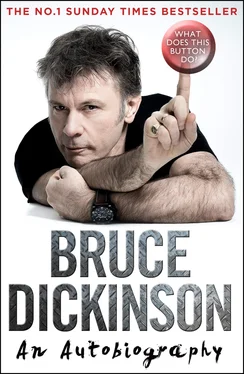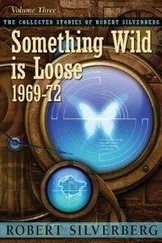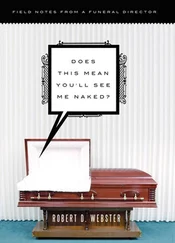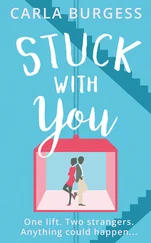1 ...8 9 10 12 13 14 ...18 However, I possessed neither a driving seat nor a drum kit. Amusingly, a drummer’s chair or stool is technically termed a ‘throne’, and while I admired the sentiment, the delusion of grandeur was of no practical help. I conscripted several volumes of The Cambridge Medieval History . My drumsticks were strips of plywood, and I arranged the leather-bound volumes like tom-toms around my small rickety desk in my study. With the speaker close to my ear, I battered them in hopeful symphony. Eventually, I snuck into the music room and purloined a pair of bongos.
There were kids at boarding school in possession of real drum kits, amplifiers and electric guitars. They rehearsed in commandeered classrooms on a Saturday or Sunday afternoon. I gatecrashed one of their rehearsals. It was disorganised and it was all about how cool they looked. It was about fashion, about posing – about nothing. I was disgusted, though slightly jealous about their equipment. I was searching for the holy grail of innocence and experience. My vision was cloudy, but my purpose was crystal clear. Entertainment, yes, but truth above all things.
Four of us formed a band, at least for five minutes. The bass player, an Australian called Mike Jordan, had made his own bass in the woodwork and electric workshops. He was also my partner in crime when it came to running the school wargames society. He had failed to evade the curse of the school choir and had a classically trained bass voice. Two acoustic guitars completed the ensemble, and we attempted to play one Saturday afternoon. The only song we could agree on was ‘Let It Be’ by the Beatles, so we gave it a go. Hideously out of time, and with my hands beaten raw on the bongos, we staggered towards the chorus, at which point Mike realised that classical bass voices did not really suit extended Liverpudlian baritones.
‘Let it be …’ dissolved into a strangled yelp, while I carried on beating the song into submission on the two available skins.
We stopped. I was disappointed, as my enthusiasm was overcoming any pretence of accuracy. Mike could not handle the vocal high notes. He cleared his throat and, sounding terribly grown up, said, ‘Perhaps we might change the key?’
I didn’t know what he was talking about, but I chimed in with: ‘How does it go?’
I opened my mouth and let rip, and the guitarists carried on to the end of the song. My head was spinning with the vibrations from the resonance of my voice. There was a surprised silence when we ran out of talent at the end.
‘You can put those fucking bongos away.’
Mike, our bass player admitted defeat: ‘I think you are our vocalist, dear boy.’
Our future in the music business thus secured, we broke for tea, margarine, jam and toast. It was 6 p.m., after all.
My acting endeavours had continued to flourish, and I had started writing and even directing, after a fashion. The Dark Tower was a radio play by Louis MacNeice, which I adapted for the stage, playing the oily butler myself as well as directing and producing it, all with the encouragement of my mentor, Mr Campbell.
My fencing classes had turned into a full-time ‘official’ school sport. Having won the school fencing championship, I was declared ‘school captain of fencing’, and I had my picture taken looking pompous with prominent sideburns.
Bullying was no more. I began to resemble the institution that I had resented. I was being assimilated, absorbed into the fabric, as if the beatings and hypocrisy were simply a test, something every chap has to go through before he changes from a caterpillar to the right sort of social butterfly.
My status, I suppose, was best described as slightly eccentric but acceptable. All that was to change on a dark November evening in 1975.
The week leading up to my exit was unremarkable. I spent spare afternoons in the study of my guitar-playing friend Chris Bertram. An unlikely duo, we pillaged the B.B. King songbook, murdering the blues, and I discovered that I could scream like a banshee and rather overdid it, but then, that’s what adolescence is for, isn’t it?
By now I was in the sixth form, only months from taking English, history and economics at A level. There was no element of coursework; it was sudden death, three hours of essay writing, and if you kept your wits about you, you might do okay.
A couple of evenings before my demise there was a comical but depressingly despotic event that took place at a lecture on Machu Picchu and the archaeology of the Incas. It was delivered by an academic explorer who also happened to be a personal friend of the headmaster, the automotively initialled B.M.W. Trapnell. Trapnell was a cosmologist by trade, and had an emollient effect on parents and also, one imagines, school governors. Five minutes into the lecture, the plug was pulled on the slide projector, and in the chaos the slides were cruelly rearranged in what was clearly a very cleverly executed hit.
The aftermath descended into a Nazi-style persecution. Names were taken and the order from the top was clear. Punishment beatings were in order; pride was at stake. A birch was used to personally beat those deemed to be the ringleaders, and it was administered by Mr Cosmology himself, a big man and, sadly for their bottoms, a very good fives player.
After the event there was tension in the air. The school was in an angry mood, but no one would storm the Bastille. Most inappropriately, therefore, two days later there was to be a celebration in Sidney House. The joyful construction of a new dwelling for our illustrious housemaster would be commemorated by the convocation of the entire authority structure of the school.
The flogging cosmologist, the deputy flogging cosmologist, plus the flogging rowing-kit fetishist and all the school prefects assembled at one dinner table. The food was to be cooked by the more minor prefects in the house.
There was an atmosphere of quiet anarchy. I sat in a study with Neil Ashford, who was 16 and pretty bright, to be honest. We had a one-ring electric hob and a bottle of cheap sherry under the desk. We were just chatting, minding our own business and slightly tiddly when there was a knock at the door. The sherry was hurriedly stowed, and a prefect stuck his nose round the door, holding a block of frozen runner beans.
‘I say, I couldn’t borrow your hob, could I? We’ve run out of cooking rings,’ he said.
We nodded assent and consigned them to the saucepan. We watched the beans defrost, then start to bubble and boil. Around this time, we both felt the urge to urinate. Through careful coordination and impressive bladder control, we relieved ourselves into an empty bottle. I did have a flashback to being one of the three witches in Macbeth . As I poured our mixed consommé into the bubbling pan I found myself recalling ‘Eye of newt and toe of frog, wool of bat and tongue of dog … add thereto, a quarter bottle of piss’. A classical education is a wonderful thing.
The mixture bubbled away, and 15 minutes later the prefect appeared and pulled out a tasty morsel. ‘Perfect,’ he pronounced. We realised that the house was devoid of authority. All were busy fawning, bowing and scraping to the jailers and floggers, in search of self-promotion, I assumed.
So we tiptoed to other studies and, like a pair of Pied Pipers, managed to obtain the keys to the house bar in the attic, and then locked ourselves in with several barrels of beer. Down below, Neil and I could see the silhouettes and shadows of The Last Supper . Not for them, but for me, as it turned out.
We slowly sipped our pints of Marston’s Pedigree and started to giggle. The rest of the bar, half-a-dozen errant souls, wanted to know what was so funny. Being daft, we told them. By break time, 11 a.m. the next day, the whole school knew. I realised that I was some kind of breathless hero, until lunchtime when one of our house prefects declared me depraved, disgusting and an abomination. After lunch, the abomination was summoned to the housemaster.
Читать дальше












